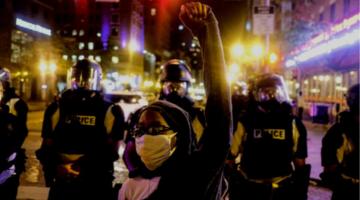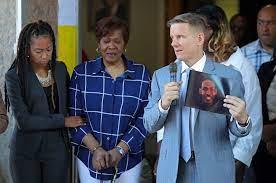In this series, we ask acclaimed authors to answer five questions about their book. This week’s featured author is Aisha Beliso-De Jesús. Dr. Beliso-De Jesús is Olden Street Professor of American Studies at Princeton University. Her book is Excited Delirium: Race, Police Violence, and the Invention of a Disease.
Roberto Sirvent: How can your book help BAR readers understand the current political and social climate?
Aisha Beliso-De Jesús: Excited Delirium: Race, Police Violence and the Invention of a Disease (Duke University Press, 2024), unpacks the origins and use of “excited delirium,” a term that has circulated as a medical diagnosis since the 1980s. The book uncovers how this term has been employed to justify and obscure the violent deaths of Black and Latine people at the hands of law enforcement. Coined by medical examiners and invoked by law enforcement and other medical professionals, the term has been used to justify deaths of people described by police as being in a state of extreme agitation, aggression, exhibiting superhuman strength, sweating profusely, and then said to suddenly die, typically following the use of forceful restraints by police. This term, which is disputed and lacks clear medical evidence, has masked the relationship between medical examiners, paramedics, and police.
In the current political climate, where scholars, activists, politicians and community members are looking to understand the long history of police violence, it is crucial to broaden our understandings of how different institutions function to facilitate racialized state violence. To better understand the relationship between law enforcement and medical personnel, this book reveals how medical justifications cover up police violence. Excited Delirium reveals the story of Charles Wetli, the medical examiner credited with coining the term excited delirium, and how he developed this concept as he became a so-called cult expert on Afro-Caribbean religions during the 1980s. By examining the criminalizing of Black, Latine and Afro-Latine peoples and practices together, this book encourages readers to question and challenge how racial color lines work to uphold structural racism deeply embedded within medical and police practices.
Moreover, Excited Delirium serves as a call to action, urging readers to advocate for accountability in law enforcement, medicine, and beyond. It underscores the importance of recognizing and addressing the racial biases that permeate various institutional practices and exposes the fallacies behind this fabricated diagnosis. The book empowers BAR readers to engage in informed discussions and activism, fostering a deeper understanding of the systemic inequities faced by Black communities. This critical awareness is essential for driving meaningful change and promoting social justice in the ongoing struggle against racial oppression.
What do you hope activists and community organizers will take away from reading your book?
In the face of persistent racial violence and systemic injustice, activists and community organizers are often employing new strategies and perspectives to effectively drive social change. One powerful yet often overlooked strategy I explore in Excited Delirium is spiritual activism. Through the religious interventions being taken up by Afro-Latine religious communities in the United States, the book examines the use of spiritual practices not only for personal resilience but also as a form of collective healing and resistance against racial oppression. Through rituals, communal gatherings, and spiritual ceremonies, working with the spirits and families of Black men killed by the police, Afro-Latine spiritual activists create a unique opening in order to make change in the world. These supportive networks foster emotional, psychological, and spiritual strength, offering a unique attunement to the vibrations of racial violence, and demonstrating insights into how Black communities have historically, and continue to, respond to the trauma inflicted by the afterlives of slavery and on-going systemic racism.
This concept of spiritual activism invites activists to expand their understanding of how to address racial violence. It emphasizes that while traditional Western forms of activism—such as protests, policy advocacy, and community organizing—are crucial tactics, thinking with how African diaspora religious communities have utilized spiritual practices can provide an additional layer of support and understanding that works to decolonize our communities. The Afro-Latine practitioners who I work with, demonstrate how spiritual activism is not a replacement but a complement to other forms of activism, enriching overall approaches to fighting racial injustice.
The book concludes with a call to revisit W.E.B. Du Bois's concept of an abolition democracy. Du Bois envisioned a society where justice, equality, and democratic participation are foundational, advocating for the dismantling of oppressive racial structures and the creation of reparative institutions. The book stresses the urgency of building (or transforming) institutions by developing “blueprints,” as Joy James argues, for social change. These blueprints must do more than just acknowledge the pervasive nature of racial oppression and systemic racism but also propose tangible solutions to overcome these injustices.
Activists and community organizers are encouraged to see broaden our toolkit for transformation, recognizing the power of spiritual practices in fostering resilience and healing. By drawing on the rich traditions of Afro-Latine religious communities and embracing the principles of abolition democracy, we can work towards the creation of a more just, equitable, decolonial society.
We know readers will learn a lot from your book, but what do you hope readers will un-learn? In other words, is there a particular ideology you’re hoping to dismantle?
An essential aspect of Excited Delirium is its focus on dismantling the deeply ingrained ideologies, structures, and practices that underpin the racist White gaze that criminalizes Black and Latine people. This racist perception operates as what I see as its own kind of "excited delirium," not a medical diagnosis, but rather, as a White lethal mindset that perpetuates racial injustice and violence.
Excited Delirium reveals how these distorted perceptions of Black criminality have historical roots, tracing back to the myth of superhuman strength attributed to Black people since slavery. These tropes can be seen in the fabricated medical diagnosis drapetomania, which was used to pathologize enslaved Africans’ desire for freedom during slavery. And they continued through the Jim Crow era, where notions of Black criminality were used to justify lynchings. These stereotypes persist, manifesting in modern policing practices and other institutional racism. For instance, the belief in superhuman strength was used to justify the brutal treatment of Black men like Eric Garner and George Floyd, both of whom were described as exhibiting extraordinary physical power, thereby rationalizing the excessive force that killed them.
This book meticulously examines these historical continuities, demonstrating how such myths serve to dehumanize Black and Latine people, making them targets of violence and reinforcing systemic racism. By exposing this process, the book aims to help readers unlearn the ideology that legitimizes racial violence under the guise of medical or scientific rationality. Ultimately, the “excited delirium” we need to dismantle is the ideology of white supremacy itself.
Which intellectuals and/or intellectual movements most inspire your work?
The abolition movements, spanning from the fight against slavery to contemporary efforts to dismantle prisons, police, and ICE (Immigration Control and Enforcement agency), profoundly inspire my work. Intellectual activists such as Angela Davis, Ruthie Gilmore, Joy James, and Kimberlé Crenshaw have provided a robust framework for understanding the intersectionality of oppression and the necessity of working towards radical, systemic change. Their work emphasizes the interconnectedness of various forms of oppression and the importance of comprehensive strategies for global liberation.
W.E.B. Du Bois’s insights into racial and economic injustices continue to be a cornerstone for understanding the enduring impact of systemic racism and the need for an abolition democracy. His vision of a society rooted in true equality and justice remains a guiding light for contemporary abolitionist movements.
Black and Latine feminist ancestors like the Combahee River Collective and the work of Gloria Anzaldúa and This Bridge Called My Back were instrumental in shaping my perspective. Their emphasis on the poetic, spiritual, and artistic approaches as vehicles for women of color feminisms and their insistence on a situated radical anti-imperialist and anti-racist scholarship have deeply influenced my approach to activism and scholarship. More recently, the works of Faye Harrison, Jemima Pierre, Christen Smith, Krystal Smalls, and The Cite Black Women collective, furthers this legacy in anthropology by advocating for the recognition and inclusion of Black women's intellectual contributions, ensuring that their voices are central in academic and activist discourses.
Organizations such as Pase La Voz in Georgia and the artist groups like House Full of Black Women in Oakland, CA, provide tangible examples of how grassroots activism and creative expression can intersect to promote social justice. These groups demonstrate the power of community-based approaches and the vital role of art in challenging and reimagining oppressive systems.
Collectively, these intellectuals and social movements inspire us towards a holistic approach to abolition, one that seeks not only to dismantle oppressive structures but also to build a society grounded in justice, equality, and communal care. Their work reminds us that abolition is not just about tearing down but also about envisioning and creating new, equitable systems that affirm the dignity and humanity of all people.
Which two books published in the last five years would you recommend to BAR readers? How do you envision engaging these titles in your future work?
Two recent books I would highly recommend to BAR readers are America on Fire by Elizabeth Hinton and Black Ghost of Empire by Kris Manjapra. Both works offer profound insights into the historical and ongoing struggles against systemic racism and the legacies of slavery.
America on Fire (2021) by Elizabeth Hinton provides a comprehensive look at the history of Black rebellion in the United States. Hinton traces uprisings in the late 1960s, following the assassination of Martin Luther King Jr., and extends her analysis to the protests following George Floyd's death in 2020. The book details numerous encounters between Black Americans and law enforcement, many of which are often forgotten. Hinton argues that these rebellions are not mere “riots” but politically motivated responses to systemic racism, harsh policing practices, and neglected community needs. This work contextualizes the current racial tensions and distrust of police, offering readers a deeper understanding of the persistent struggles faced by Black communities.
In Black Ghost of Empire (2022), Kris Manjapra delves into the global history of emancipation, revealing how the end of slavery did not usher in a new era of equality and human rights. Instead, Manjapra identifies five types of emancipation across the Atlantic world that, rather than dismantling racial hierarchies, reinforced them. The book argues that these perceived failures were intentional, aimed at preserving racial oppression. Manjapra also highlights how grassroots Black organizers and activists have worked towards collective recovery and remedy, maintaining the struggle for true freedom and justice. This book challenges readers to rethink the conventional narratives of emancipation and understand the lasting impacts of slavery.
I am currently completing a book, Zombie Patrol: Policing Afro-Latine Religions, which examines the criminalization of Afro-Caribbean religions in the US through ethnographic research with police. During this troubling moment, it is vital that scholars continue to work to unravel the operations of systemic racism and police violence and the response of marginalized communities’ responses. To analyze the enduring legacies of racial oppression that impact Black communities globally, this work is about freedom and racial justice.
Roberto Sirvent is the editor of the Black Agenda Report Book Forum.



















